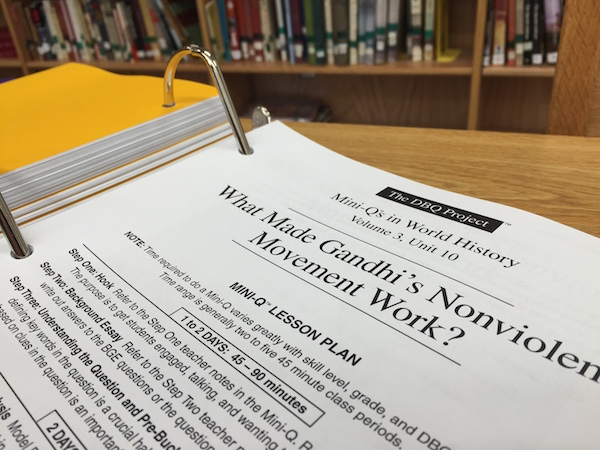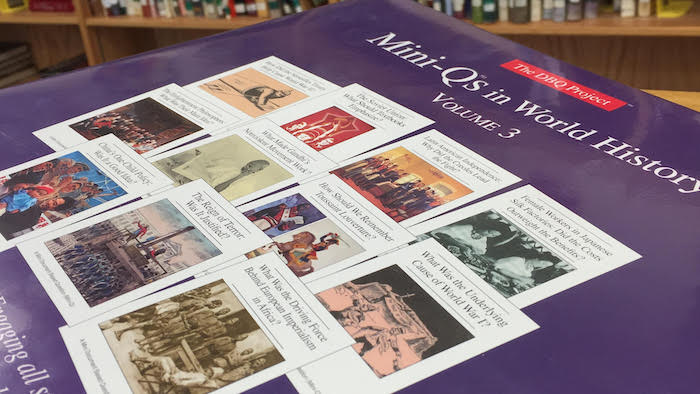Preparing College-ready Students at Red Cloud Indian School:
Faculty will Utilize Document Based Questions (DBQs) to Improve Students’ Research Writing Skills and Postsecondary Achievement
posted January 29, 2015
 Last week, social studies and English teachers at Red Cloud Indian School came together to focus on incorporating DBQs into their classroom—also known as ‘Document Based Questions.’ Phil Roden and Beth Montgomery of The DBQ Project, a curriculum development company out of Illinois, began by giving the teachers a short document during their workshop and asked them to consider something utterly fundamental, yet often overlooked: What is the question we are looking to answer in this document?
Last week, social studies and English teachers at Red Cloud Indian School came together to focus on incorporating DBQs into their classroom—also known as ‘Document Based Questions.’ Phil Roden and Beth Montgomery of The DBQ Project, a curriculum development company out of Illinois, began by giving the teachers a short document during their workshop and asked them to consider something utterly fundamental, yet often overlooked: What is the question we are looking to answer in this document?
“After conducting our gap analysis at Red Cloud we realized that writing, specifically research writing, was an area for improvement,” said social studies department chair Maka Clifford ‘05. “Research writing requires students to be able to efficiently and accurately answer a research question by knowing how to collect evidence, utilize evidence appropriately, and produce effective, clear writing.”
“It’s hard,” Clifford notes. “Many people don’t really, fully develop an understanding of how to research and write based on that research even after they’ve received their college degree, and even less frequently in high school.”
Clifford and his colleagues raise the question: How do we teach students this skill and how can we better prepare them for the expectations of life after high school? Through his research into best practices, he found that DBQs—a process of teaching research writing skills through directed multiple document analysis—are both Common Core oriented and address the multistep process they needed to teach to get student on the right track and better prepare them for post-secondary education.
“This is when I found The DBQ Project,” said Clifford. “I saw that they had been developing a sophisticated program utilizing DBQs for more than a decade and that it was both well-received and relevant.”
After some initial conversations, The DBQ Project’s Phil Roden and Beth Montgomery were on there way to Red Cloud Indian School for a day-long intensive workshop to introduce faculty to the program.
Roden, like Clifford, understood that mastering the research writing process was difficult, yet vitally important to success in post-secondary education. And from that difficulty, he and his colleagues sought a method that could better prepare the next generation of college-going students for their futures.
“I went through four years at Yale and I can tell you, I didn’t always understand what I read—that there was a question to be answered in every reading.” says Roden, the co-founder and co-author of the DBQ project. “DBQs help you understand that there is always a question to answer and help you determine what it is. Once you have that, you can focus on what you need to do and what pieces of information you need to pay attention to when you read.”
Roden noted how valuable it is for students to develop an ability to prioritize pieces of information when presented with multiple sources of information—especially in today’s digital world—and to understand how to analyze those pieces in order to accurately and efficiently present that information in writing.
“DBQs help students understand this more than any other vehicle that I know of,” explains Roden, an educator with more than three decades of teaching experience and the author of two text books. “It’s about reading for understanding, then analyzing the documents, ferreting out the evidence, creating reasoning based on that evidence, and finally putting that into writing.”

The skill of being able to internalize and understand information that is provided to you is universally beneficial, explained Roden and his colleague to Red Cloud faculty, yet he believes many students are not given adequate opportunities in primary and secondary education to practice and refine this ability.
“In a compressed period of three to five days, students—no matter what their background is—can be engaged in all of the activities needed to analyze, rationalize and articulate information,” said Roden of The DBQ Project. “It’s not that any of these tasks are unique or new, but using DBQs is a compressed way to practice all of them. And not only that, but specifically in our program, we’ve looked very closely at each step and tried to make it egalitarian and relevant, whether you’re a student in Illinois, Texas or South Dakota.”
Adopting The DBQ Project’s program into the curriculum is the latest addition in a school-wide initiative to better prepare students for college, explains Moira Peckskamp, Red Cloud’s Director of Curriculum and Assessment, who is responsible for providing teachers with the tools and framework to increase student achievement.
“Utilizing The DBQ Project provides a structure for teaching students to think and write using higher order thinking skills,” explains Peckskamp. “I believe that the Common Core standards involving informational, non fiction texts are best taught through this process. It defines a structure to help teachers help students.”
Teaching meaningful and relevant academic writing skills, including the expository and persuasive techniques, explains Peckskamp, is something the nation’s top universities and academic institutions expect from matriculating students. With the implementation of The DBQ Project, she expects students’ achievement will grow exponentially.
“Students who are skilled at the DBQ process will demonstrate fluency in a majority of Common Core standards,” said Peckskamp. “They will be better able to determine what the author of a document was saying, what they really meant, and how that relates to the topic they are studying in class.”
Peckskamp, Clifford and Roden believe that the skills that can be developed through the use of DBQs will ultimately lead to a more well-rounded student, capable of analyzing not only the information given to them in a classroom setting, but throughout life in their chosen careers.
Ultimately, Peckskamp and the faculty at Red Cloud Indian School strive to increase achievement throughout a student’s time at the school by finding and introducing curriculum tools like The DBQ Project. Through increased attention to curriculum alignment and implementation, they expect to see students graduating with the ability to compete with peers and meet or exceed the expectations of college and post high school in the 21st Century.
